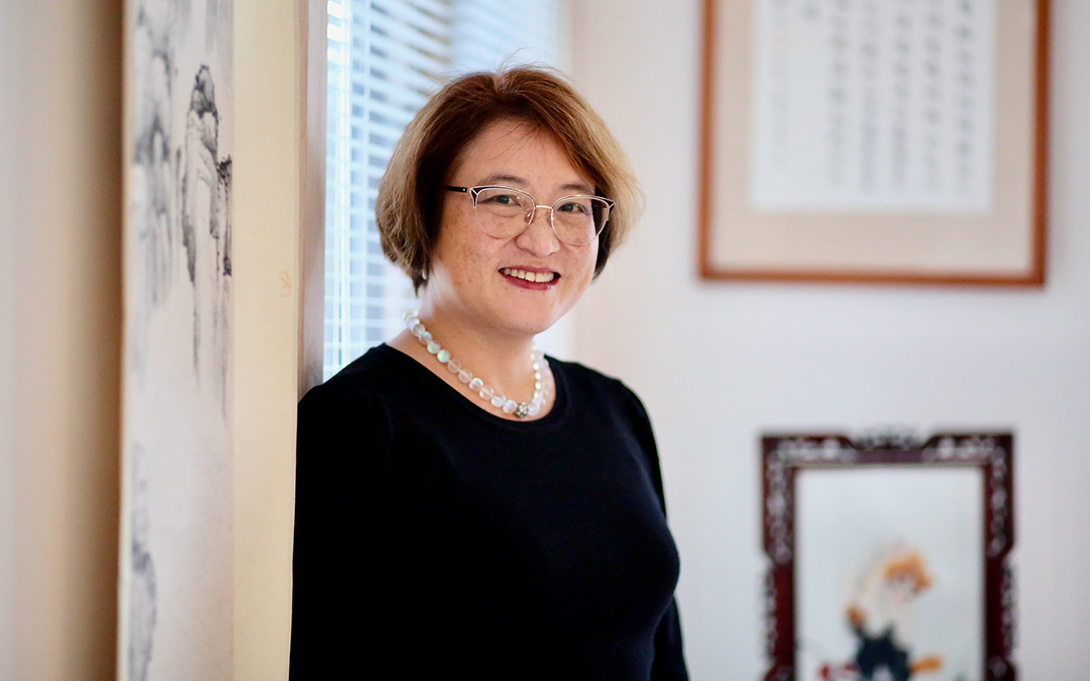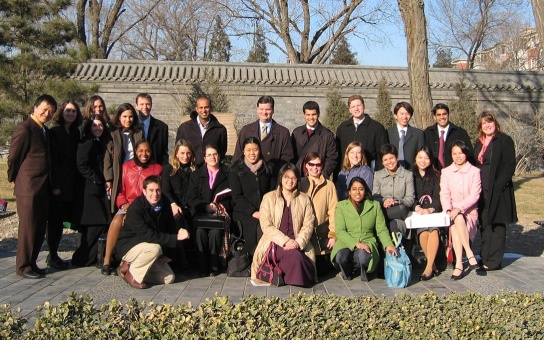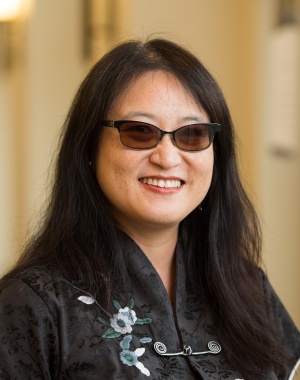
By David Pratt
In November 2021, longtime Ford School political scientist Ann Chih Lin was appointed as director of the Lieberthal-Rogel Center for Chinese Studies (LRCCS). Established in 1961, the China Center is one of the nation’s most prominent centers devoted to a deeper understanding of China, past and present.
State & Hill: Let’s start with a big question: Why Ford? Why did you come, and why have you stayed?
Ann Lin: Michigan was the only school that interviewed me for an academic job—and I got it! I wasn’t sure I wanted to be in academia then, but I came because of U-M’s fantastic reputation. I stayed because the University and Ford are incredibly supportive of interdisciplinary work, and because our students are so interesting. Unlike undergrads or PhD students, MPPs want to know why they’re learning something. It’s changed my whole approach to teaching.
S&H: What was your own journey as a student?
AL: I was born and grew up just outside Philadelphia but the year I entered seventh grade, my parents took a sabbatical in Taiwan. They dropped me into seventh grade even though my literacy was more like a second grader’s. But that year I began to learn about Chinese history, geography, and classical Chinese literature. I later returned to Taiwan for more language training and developed a real interest in Asia. But I also got involved in Catholic social justice activism in college, and decided to make social justice in the U.S. my focus. So I wrote a book about prison rehabilitation policy and then started studying immigration. It’s been a long road back to China!

S&H: How did Ford’s annual trips to China begin?
AL: In 2006, I took 20 MPPs to Beijing on an IEDP trip. I was amazed at how much access we had to people doing policy work of all kinds, so that in 2010, when the idea of an annual China trip was proposed, I was eager to help. We went every year from 2011–2019 and hopefully will start again next year.
S&H: China has become more open and more closed in recent years. How has this affected collaborations with the U.S.?
AL: When we went in 2006, China was preparing to host the 2008 Olympics; it was a real period of openness. In the U.S. we thought China was opening to us, but in fact China was opening to the world—Africa, Latin America, Europe, and not just to the U.S. That threatened some American policymakers; the Obama Administration created a “pivot to Asia” to counter China’s growing influence on its neighbors. And just as the U.S. was getting more cautious, so was China. The Chinese government wants engagement with the world and more control over Chinese society. So we’re witnessing its re-dedication to authoritarian governance.
S&H: What has been the U.S. response?
AL: A significant part of our national security establishment believes that China deliberately sends Chinese students here to act as “nontraditional collectors” of information. They believe that Chinese will always do anything they can to help China at the expense of the U.S. If that’s your fear, then goodbye international education, open science, trade—any and every encounter is a potential threat.
I want to point out that this is crazy! American universities encouraged collaborations between their faculty—not only their Chinese American faculty—and universities in China because the U.S. benefits from working with the best and the brightest all over the world. Science doesn’t win by hiding secrets; it wins by making discoveries public so others can build on them.
The FBI thinks universities need to wise up and shut China—and Chinese—out. It doesn’t understand that if we stop collaborating, the U.S. will be less competitive, not more.
S&H: What are the consequences for those Chinese-American faculty?
AL: Faculty who have been American citizens for years are stopped coming back to the U.S. and asked why they went to China and who they saw. Their laptops and passwords are confiscated. They are cold-called by the FBI. The Department of Justice sets up stings at universities to take down academics they suspect of stealing secrets. Federal granting agencies pressure universities to investigate Chinese-American researchers.
I did a study and found that 71% of Chinese-American faculty interviewed didn’t feel safe in the United States or were worried about how things would develop. Senior researchers with government grants said they didn’t want to apply for these grants anymore, they might not stay in the U.S., and their students might not stay. If we want to enhance American competitiveness, we need this talent to stay in the U.S.!
S&H: Tell us about your work on immigration.
AL: I work with Arab immigrants in Southeast Michigan and see parallels between their situation and the hate directed against German-Americans during World War I and Japanese-Americans during World War II. My work with the Arab American community also made me more aware of the oppression of Muslim minorities in China, particularly Uyghurs in Xinjiang Province. I’m very excited about the opportunity to bring more work on Chinese diasporas to the LRCCS.
S&H: Tell us about your new position as director of U-M’s Lieberthal-Rogel Center for Chinese Studies.
AL: The center is at the forefront of Chinese studies in the U.S. It has a 60-year history at U-M, and covers everything Chinese—history, literature, archeology, culture, music, art, politics, society, economics. Coming from an interdisciplinary school like Ford gives me ideas about how to pull people in all of these different fields together. My vision for the center is informed by my good fortune in being at Ford all of these years.
The very difficult relationship between the U.S. and China makes me the right person for this job at this time. I don’t have academic collaborations in China, so I’m not worried about threats from either the Chinese or the American side. I have the freedom to speak out on behalf of my colleagues who do have those collaborations. And it’s a good time for someone who’s both Chinese and American to say that we can’t give up on the Chinese-American relationship.
S&H: You’ve got a remarkable family history with the University of Michigan. Tell us that story.
AL: My great-great-grandfather came to the U.S. as a “coolie” in the 1800s. He worked in San Francisco to send money back to China to educate his son and grandson. His money allowed my grandfather to earn a degree in economics at one of China’s new, foreign influenced universities. There he met and married my grandmother, who was one of the first women in China to study electrical engineering. Then he left China, when my grandmother was pregnant with their first child, with a scholarship to the U.S. The first thing he did was go to San Francisco to locate his grandfather’s grave and ship the bones back to China. Then he came to U-M for a master’s degree in political economy.
When he graduated, the Sino-Japanese War had begun, and he couldn’t go back. He didn’t have money to stay at U-M beyond his master’s, so he went to San Francisco as a journalist for a Chinese newspaper. There he met a Chinese immigrant who had become wealthy from running laundries and restaurants. That immigrant saw students like my grandfather as the future of China and offered to send my grandfather to get his PhD at the London School of Economics. He finished his degree but couldn’t get home until the end of World War II, when he met his nine-year-old daughter, my mother, for the first time. He was able to give her an education that enabled her to get a scholarship for her PhD at Columbia University. Now, her daughter has become the director of the U-M Center for Chinese Studies . . . I’m choking up. This is not a job that I looked for, and yet I find it so miraculous and so meaningful that I am able to do this.
When I got the job at Michigan, my grandfather was still alive. He came to visit me, and I took him to Rackham, to his old apartment on Church Street, and to lunch at the faculty club. It was pretty incredible.
More in State & Hill
Below, find the full, formatted spring 2022 edition of State & Hill. Click here to return to the Spring 2022 S&H homepage.

